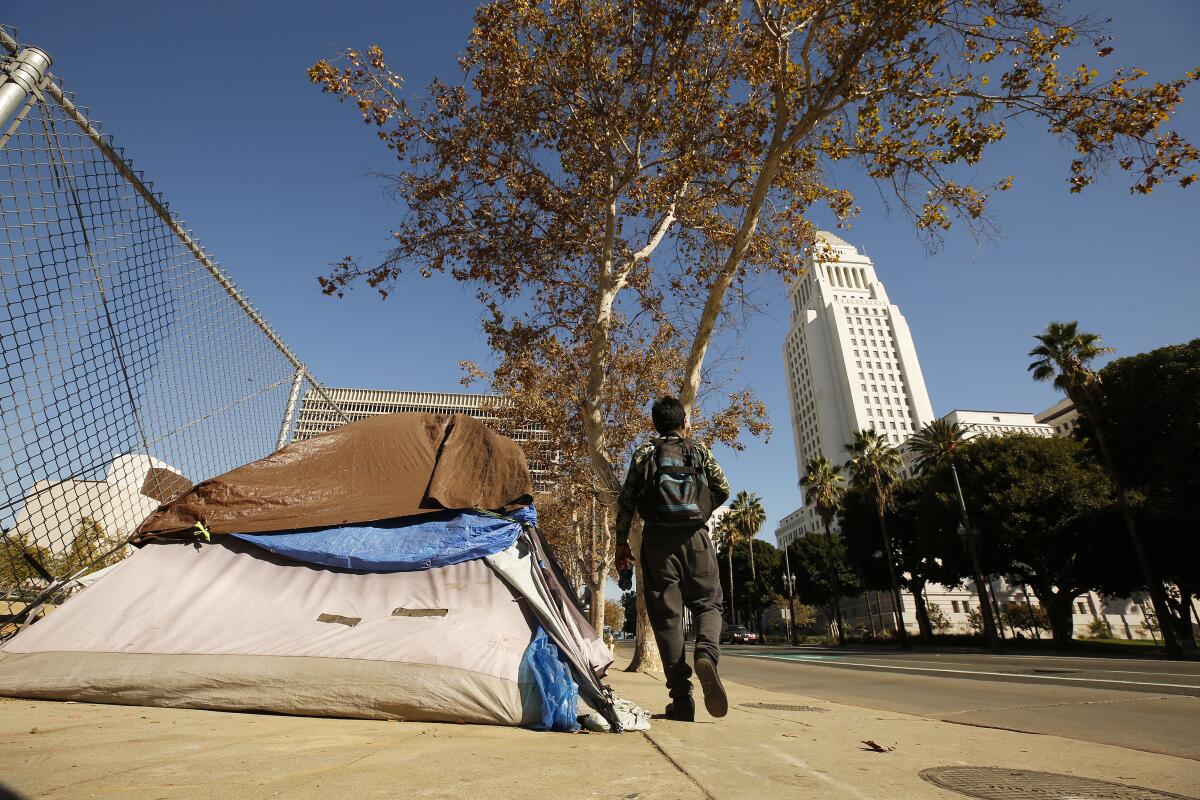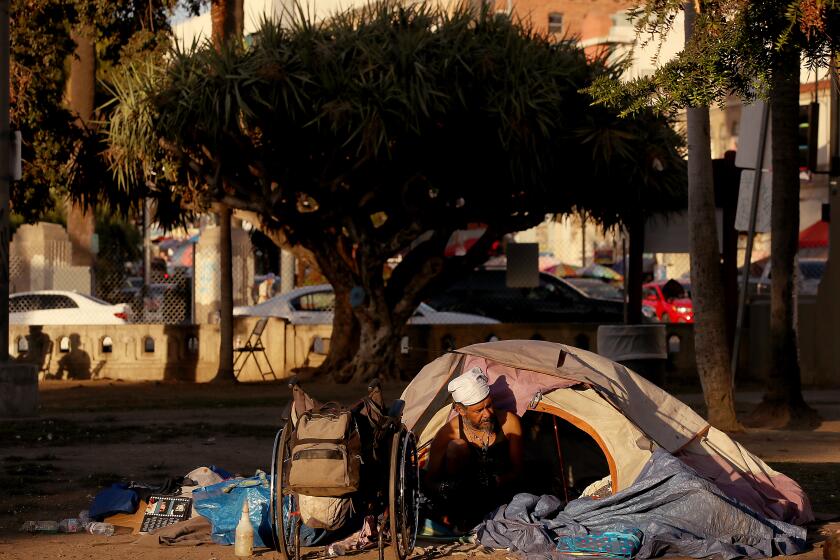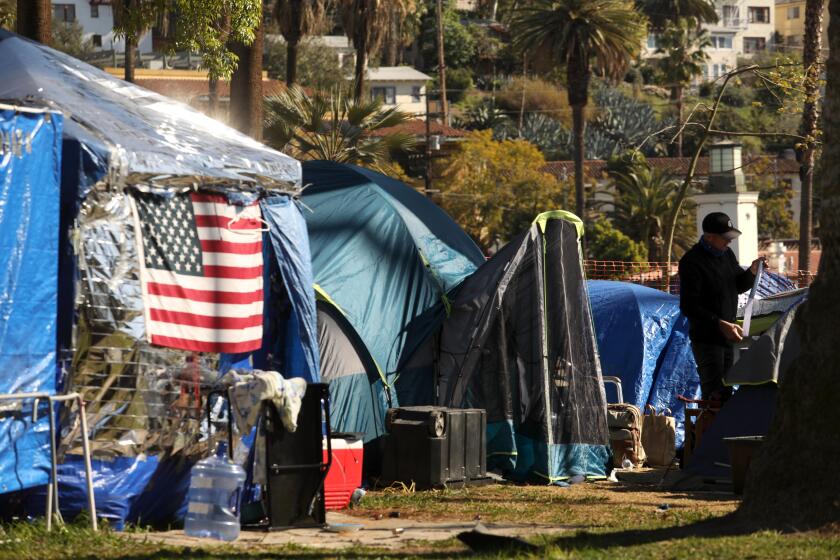Tax proposed on L.A. property sales over $5 million to fund homeless housing

In an ambitious effort to address the homelessness crisis in Los Angeles, a coalition of housing advocates, labor unions and progressive activist groups plans to file paperwork Thursday for a ballot measure that would increase taxes on real estate transactions in the city to fund permanent housing for homeless people and those at risk of ending up on the street.
The organizers hope to collect nearly 65,000 signatures by spring to place the tax proposal on the November 2022 ballot.
The measure would levy a 4% tax on property sales above $5 million that would rise to 5.5% on transactions above $10 million. The buyer or seller would owe $200,000 on a $5-million sale, for example.
âThis is really about millionaires and billionaires paying their fair share to have a transformative approach to solving our housing crisis,â said Laura Raymond, director of the Alliance for Community Transit-Los Angeles, or ACT-LA, and a leader of the ballot measure coalition.
âThis affects folks who are very privileged who have made money off increases in property values, and inequity is one of the reasons why weâre in the situation we are in. So itâs making sure that weâre sort of looking out for each other in protecting our neighbors,â Raymond said.
L.A. voters want the government to focus on shelter for homeless people living in the streets, even if those efforts are short term, a poll has found.
The coalition said the tax would have applied to about 3% of all property sales in the city from March 2019 to March 2020, generating about $800 million.
The proposed ballot initiative, United to House L.A., could benefit from a recent California Supreme Court ruling affirming that tax increases proposed by citizen initiatives need only a simple majority vote to pass, rather than two-thirds. This ruling was reaffirmed last year and allowed San Francisco to begin spending nearly $300 million a year in business taxes to fight homelessness.
Whatâs being proposed is known as a documentary transfer tax. The city of Los Angeles already has a similar tax that sends revenue into the general fund, though at a lower rate than what is proposed for the ballot measure. Berkeley, Oakland and Culver City also impose a documentary transfer tax to fund services.
Homelessness will be the dominant issue in Los Angeles elections next year as many candidates vie to replace Mayor Eric Garcetti and compete for a number of City Council seats.
A recent countywide Los Angeles Times poll, conducted in cooperation with the Los Angeles Business Council Institute, found deep frustration over widespread, visible homelessness in Los Angeles. Those voters surveyed showed some willingness to be taxed again to help address the crisis.
By 51% to 41%, voters said they would support a tax increase to âcreate permanent initiatives to help homeless individuals and reduce the homeless population.â Support increased to 63% if a tax increase included a clear plan to ensure accountability and transparency.
A recent report from the California Housing Partnership found that about 500,000 low-income renters donât have access to affordable housing in Los Angeles County.
Los Angeles city voters in 2016 approved Proposition HHH, a $1.2-billion bond measure to fund homeless housing. In 2017, county voters passed Measure H, a 10-year, quarter-cent sales tax increase to fund homeless services. Politicians and voters have been frustrated by the slow opening of housing projects funded by Proposition HHH. More than 7,000 units have been funded but construction has been completed on about 1,000 as of last month.
The coalition backing the proposed ballot measure has some two dozen members, including IBEW Local 11, the Inner City Law Center, the Los Angeles Community Action Network and Venice Community Housing.
Some of the groups backing the new ballot initiative were key supporters of both earlier measures, and one of the major supporters of the earlier efforts, the United Way of Greater Los Angeles, is helping craft this measure.
Chris Hannan, executive secretary of the Los Angeles/Orange County Building and Construction Trades Council, said itâs essential that more affordable housing gets built in the city and that canât happen without more government funding.
âOur members are going to be relied upon to help deliver this housing, and we want to make sure that weâre delivering the housing with good local jobs and really local careers for the community,â he said.
Some in the real estate industry were critical of the tax proposal.
âIncreasing more taxes on real estate transactions sends the wrong message as it further increases the already high cost of housing in the region without addressing the core issue â that we are still in a housing production and affordability crisis,â said Stan Smith, president of the Greater Los Angeles Realtors Assn., noting his organizationâs support of Measure H.
The revenue from the proposed tax would create more than 26,000 homes for homeless people over the next decade and help about 475,000 renters stay in their homes each year, according to coalition estimates.
For some candidates, thousands of new tiny homes, rented hotel rooms and other forms of short-term shelter are the place to start solving homelessness.
About 70% of the proceeds would be spent on various forms of affordable housing.
About a quarter of the total revenue would seek to fund projects through the sale of state and federal low-income housing tax credits, similar to how Proposition HHH works.
About one-third could be spent on turning existing buildings into homeless housing, through purchases, master leases and renovations.
Last year, Los Angeles rented and eventually bought vacant hotels during the pandemic to house homeless people, spending state and federal funds through programs known as Project Roomkey and Homekey.
Most of the remaining money would fund homelessness prevention programs such as right-to-counsel and rental assistance, as well as an inspector general and citizens oversight committee.
Money to help people stay in their homes has been a key response to the pandemic.
âThe housing insecurity that we had pre-pandemic was severe, and coming out of the pandemic, whenever that may be, it is going to be even more severe,â said Favian Gonzalez, assistant director of organizing for the tenant advocacy group Strategic Actions for a Just Economy.
The coalition effort is not the only homelessness-related initiative for Los Angeles that could make the November ballot. Mayoral candidate and Councilman Joe Buscaino plans to collect signatures for a ballot measure that would prohibit people from sleeping or camping on sidewalks and other public spaces if they have turned down offers of shelter or emergency housing.
Times staff writer Andrew Khouri contributed to this report.
More to Read
Sign up for Essential California
The most important California stories and recommendations in your inbox every morning.
You may occasionally receive promotional content from the Los Angeles Times.









